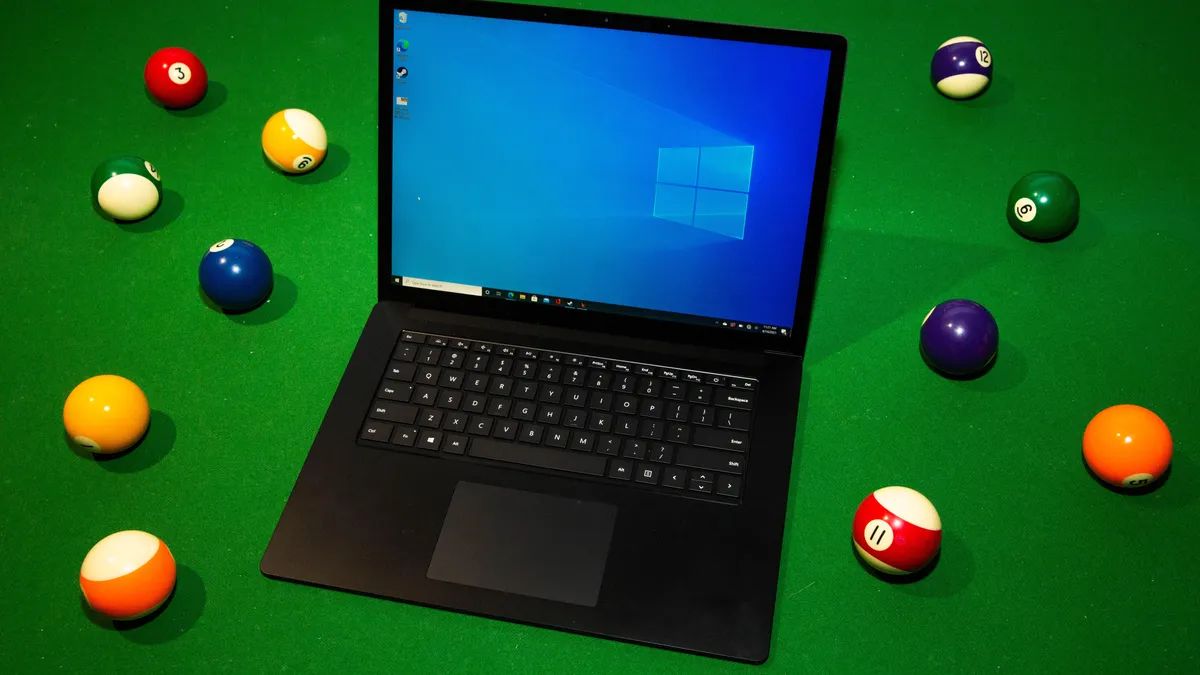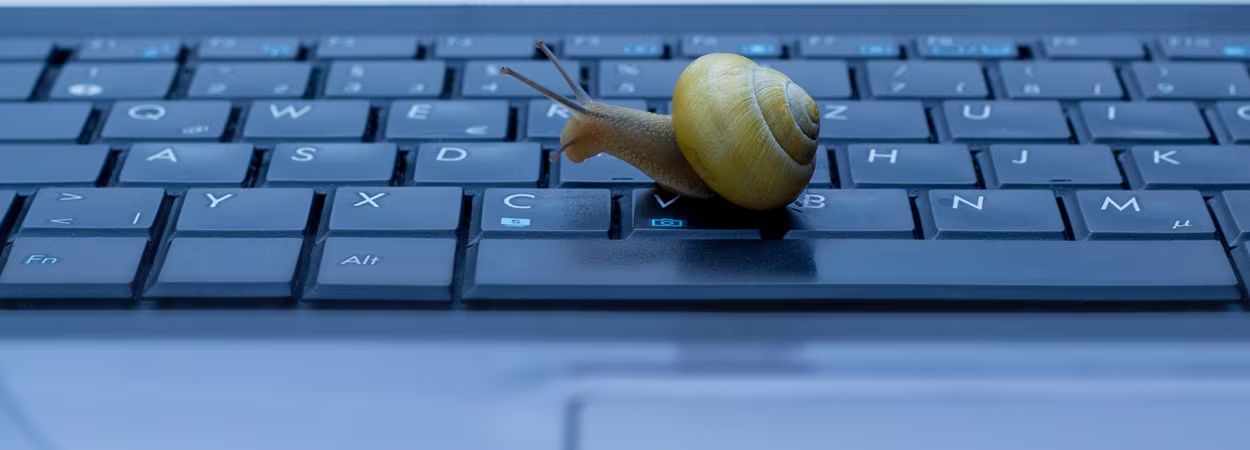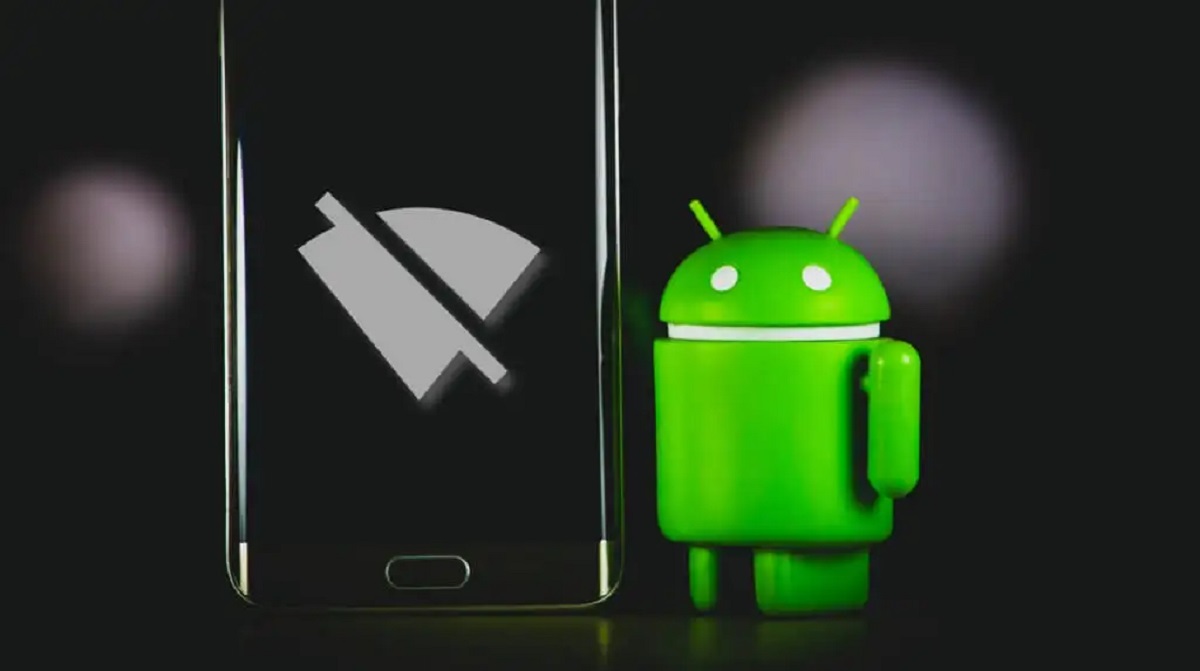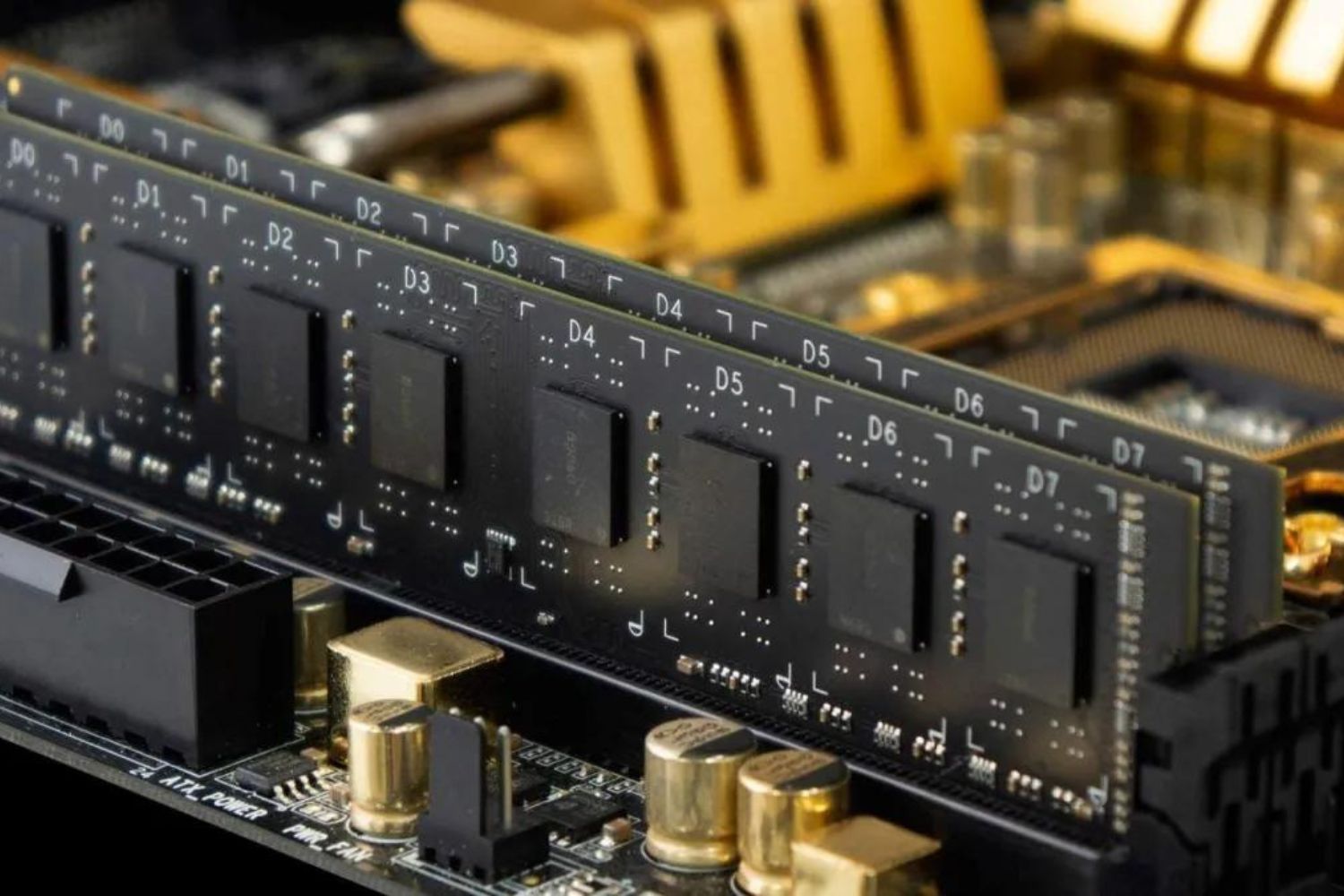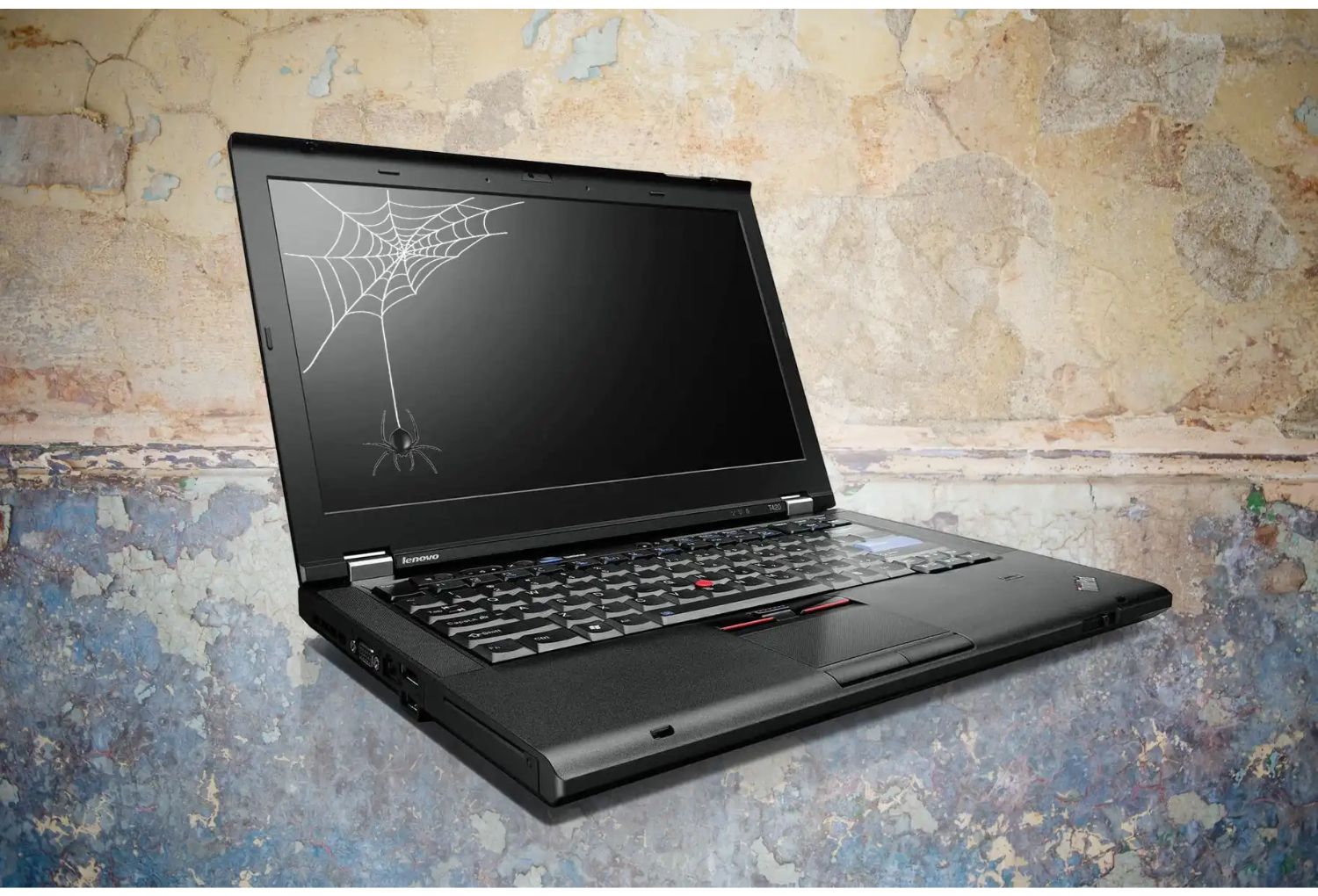Introduction
Gaming laptops are designed to offer high-performance capabilities that enable gamers to enjoy their favorite games with stunning visuals and smooth gameplay. However, even the best gaming laptops can sometimes experience slower download speeds, which can be frustrating when you’re eager to download a new game or update.
In this article, we will explore the reasons why your gaming laptop may have slower download speeds and provide tips on how to improve them. By understanding the factors that affect download speeds and implementing the right solutions, you can ensure a smoother and more enjoyable gaming experience.
Downloading games, updates, patches, and other digital content is an integral part of gaming today. Whether you’re downloading the latest AAA titles or user-generated mods, having fast and reliable download speeds is crucial. Therefore, it’s essential to identify the underlying causes that may be causing slow download speeds on your gaming laptop.
In the following sections, we will delve into the factors that can impact download speeds and provide effective solutions to optimize your gaming laptop’s performance. By following these tips, you’ll be able to enjoy faster download speeds, reducing the waiting time and enabling you to jump into your favorite games more quickly.
Background: Gaming Laptops and Download Speeds
Gaming laptops have become increasingly popular due to their power and portability. These specialized devices are designed to handle resource-intensive games and provide gamers with a seamless and immersive experience. However, when it comes to downloading games or updates, some users may notice slower speeds compared to other devices. To understand why this happens, it’s important to consider the factors that contribute to download speeds on gaming laptops.
One crucial factor is the network connection. Gaming laptops rely on internet connectivity to download games and updates. If the network connection is slow or unstable, it can significantly impact download speeds. Additionally, network traffic can also affect download speeds. During peak times, when many users are accessing the same network, the available bandwidth is divided among them, resulting in slower download speeds.
Another aspect to consider is the hardware limitations of the gaming laptop itself. While gaming laptops are equipped with powerful processors and ample RAM, they may not always prioritize network bandwidth. Other hardware components, such as the Wi-Fi adapter or Ethernet port, could also contribute to slower download speeds if they are not optimized for high-speed data transfer.
Software issues can also play a role in affecting download speeds. Outdated network drivers or conflicting software can hinder the performance of your gaming laptop’s network connection, resulting in slower download speeds. Additionally, certain background programs or services consuming system resources can impact the bandwidth available for downloads.
Understanding these factors is crucial for troubleshooting and improving download speeds on your gaming laptop. By addressing these issues and implementing the right solutions, you can ensure that your gaming laptop performs optimally and provides faster download speeds for an enhanced gaming experience.
Factors Affecting Download Speeds on Gaming Laptops
Several factors can contribute to slower download speeds on gaming laptops. By understanding these factors, you can identify the root cause of the issue and take appropriate steps to improve your download speeds. Here are some of the main factors that can affect download speeds on gaming laptops:
1. Network Connection: The quality and speed of your network connection play a significant role in determining download speeds. If you have a slow or unstable internet connection, it can result in slower download speeds on your gaming laptop. Issues with your ISP, router, or modem can all impact the network connection and hinder download speeds.
2. Network Traffic: Network congestion and high traffic can also affect your download speeds. During peak usage times, such as evenings or weekends, many users are simultaneously accessing the internet, leading to a decrease in available bandwidth. This can result in slower download speeds, especially for large files or game updates.
3. Hardware Limitations: While gaming laptops are designed with powerful hardware components, certain limitations can affect download speeds. For example, if your Wi-Fi adapter does not support high-speed connections, it can bottleneck your download speeds. Similarly, using older Ethernet ports or cables may limit your ability to achieve fast download speeds.
4. Software Issues: Outdated or conflicting software can hinder your gaming laptop’s network performance. Ensure that you have the latest network drivers installed, as outdated drivers can impact download speeds. Additionally, certain background programs or services that consume system resources can compete for bandwidth and slow down your download speeds.
Understanding these factors can help you diagnose and troubleshoot the reasons for slower download speeds on your gaming laptop. By addressing these issues, you can optimize your network connection and maximize your download speeds for a smoother gaming experience.
Network Connection
The network connection is a crucial factor that can significantly impact the download speed on your gaming laptop. Several aspects of your network connection can affect the overall performance and speed of downloads. Here are some key points to consider:
Internet Service Provider (ISP): The quality and speed of your internet connection depend on your ISP. Different ISPs offer varying levels of service, and if you’re experiencing consistently slow download speeds, it may be worth contacting your ISP to inquire about the available options for a faster connection.
Router Placement: The physical placement of your router can affect the signal strength and download speeds. Ensure that your gaming laptop is within a reasonable proximity to the router to receive a strong and stable Wi-Fi signal. Thick walls, interference from other electronic devices, or distance from the router can all hamper the signal quality and result in slower download speeds.
Wi-Fi Signal Strength: If you’re using a Wi-Fi connection, the signal strength can significantly impact download speeds. A weak signal can lead to slower download speeds and cause interruptions during the process. To improve the signal strength, consider positioning the router in a central location, away from obstructions, and reducing interference from other Wi-Fi networks or electronic devices.
Wi-Fi Network Band: Check if your Wi-Fi network is operating on the optimal band. Many modern routers support both 2.4 GHz and 5 GHz bands. The 5 GHz band offers faster speeds and is less crowded, while the 2.4 GHz band has better range but can be more congested. If possible, connect your gaming laptop to the 5 GHz band to maximize download speeds.
Ethernet Connection: For the best download speeds, consider using a wired Ethernet connection instead of Wi-Fi. Ethernet connections offer higher stability and faster speeds compared to wireless connections. If your gaming laptop has an Ethernet port, connect it directly to the router to ensure optimal performance for downloads.
Taking these factors into account and optimizing your network connection can go a long way in improving download speeds on your gaming laptop. By ensuring a stable and fast internet connection, you can enjoy faster downloads and seamless gaming experiences.
Network Traffic
Network traffic refers to the amount of data being transmitted over a network at a given time. The level of network traffic can impact your download speeds on a gaming laptop, especially during periods of high usage. Here are some factors to consider related to network traffic and how they can affect your download speeds:
Peak Usage Times: Network traffic tends to be higher during peak usage times, such as evenings or weekends, when more users are accessing the network. During these times, the available bandwidth is divided among the users, resulting in slower download speeds. If possible, try to schedule your downloads during off-peak hours to enjoy faster download speeds.
Downloading Large Files or Updates: The size of the file or update you’re downloading can also impact download speeds. Larger files require more data to be transferred, which can lead to slower speeds, especially if you’re sharing the network with other users. Keep in mind that downloading several large files simultaneously can further strain the network and decrease download speeds. Consider prioritizing your downloads or scheduling them one at a time to optimize speeds.
Shared Internet Connection: If you’re sharing your internet connection with other users or devices, the network traffic from those devices can impact your download speeds. Bandwidth-intensive activities like streaming, online gaming, or file sharing by others on the same network can lead to slower download speeds for your gaming laptop. Communicate with other users to schedule activities that require high bandwidth during times when you’re not downloading to maximize your speeds.
Quality of Service (QoS) Settings: Some routers offer Quality of Service (QoS) settings that prioritize certain types of internet traffic over others. By enabling QoS settings, you can allocate more bandwidth to gaming-related activities and download processes. This can help ensure that your download speeds remain unaffected even during peak network traffic periods.
Network Congestion: Network congestion can occur when multiple connections are competing for limited bandwidth in a specific area. This can be more common in densely populated areas or in environments with many Wi-Fi networks. If you’re experiencing consistently slow download speeds due to network congestion, consider switching to a less crowded Wi-Fi channel or connecting to a wired Ethernet connection for faster and more stable speeds.
By keeping an eye on network traffic and implementing strategies to manage it effectively, you can optimize your download speeds on your gaming laptop. Being mindful of peak usage times, prioritizing downloads, and understanding the impact of shared connections can help you enjoy faster downloads and a smoother gaming experience.
Hardware Limitations
While gaming laptops are equipped with powerful hardware components to handle demanding games, certain limitations can impact download speeds. Understanding these hardware limitations can help you identify potential bottlenecks and take appropriate steps to improve download speeds. Here are some key factors to consider:
Wi-Fi Adapter: The Wi-Fi adapter in your gaming laptop plays a crucial role in determining the speed of your wireless internet connection. Older or lower-end Wi-Fi adapters may not support the latest Wi-Fi standards or have slower transfer rates, which can result in slower download speeds. Consider upgrading your Wi-Fi adapter to a more advanced model that offers better performance and higher speeds.
Ethernet Port: If you’re using a wired connection, the Ethernet port on your gaming laptop can impact download speeds. Older or budget laptops may have slower Ethernet ports that limit the maximum speed achievable. To ensure optimal download speeds, consider using a gaming laptop with a Gigabit Ethernet port, which offers faster and more reliable wired connections.
Network Interface Card (NIC): The network interface card or NIC is responsible for managing the communication between your gaming laptop and the network. Outdated NIC drivers or hardware issues can result in slower download speeds. Ensure that you have the latest drivers installed for your NIC and consider updating the firmware if available to ensure optimal performance.
Storage Speed: The speed of your storage device can affect download speeds, especially if you’re downloading files directly to your gaming laptop’s hard drive or SSD. Older or slower storage devices may limit the write speeds and can slow down the overall download process. Consider upgrading to a faster SSD or using an external storage device with faster transfer rates if you frequently download large files.
Processor and RAM: While the processor and RAM primarily impact gaming performance, they can indirectly affect download speeds. If your gaming laptop is already under heavy load due to resource-intensive games or background processes, it may have limited resources available for downloading, resulting in slower speeds. Closing unnecessary background processes or upgrading your gaming laptop’s RAM can help ensure a smoother and faster download experience.
Taking these hardware limitations into account and addressing any potential bottlenecks can significantly improve download speeds on your gaming laptop. Upgrading Wi-Fi adapters, ensuring faster storage devices, and optimizing CPU and RAM usage can help maximize the potential of your gaming laptop and provide faster download speeds for an enhanced gaming experience.
Software Issues
Software issues can also significantly impact the download speeds on your gaming laptop. It’s important to identify and address these issues to ensure optimal performance and faster downloads. Here are some common software issues that can affect download speeds:
Outdated Network Drivers: Network drivers are essential for establishing and maintaining a stable network connection. Outdated network drivers can result in slower download speeds as they may not be optimized for the latest network protocols. To improve download speeds, regularly check for driver updates from your gaming laptop manufacturer’s website or the website of the network adapter manufacturer. Updating to the latest drivers can help improve network performance and enhance download speeds.
Software Conflicts: Conflicting software, such as firewalls or antivirus programs, can interfere with network connections and impact download speeds. These programs may mistakenly flag or restrict certain network traffic, resulting in slower downloads. Temporarily disabling or configuring these software programs to allow downloads from trusted sources can help resolve the issue and improve download speeds.
Background Programs: Certain background programs or processes running on your gaming laptop can consume system resources and impact download speeds. For example, software update services, backup programs, or cloud sync applications may consume network bandwidth, reducing the available speed for downloads. Close any unnecessary background programs or limit their bandwidth usage to free up resources and improve download speeds.
Download Manager Settings: If you’re using a download manager or accelerator to handle your downloads, the settings within the software itself may affect download speeds. Ensure that the maximum download speed within the download manager settings is set to the appropriate value. Sometimes, these settings are capped by default, resulting in slower speeds. Adjusting these settings can help achieve faster downloads.
Firewall and Network Settings: Check your firewall and network settings to ensure they are not unnecessarily restricting or filtering network traffic. Overly restrictive firewall settings or network settings that prioritize certain types of traffic can result in slower download speeds. Configure your firewall and network settings to allow faster and unrestricted access to the necessary ports and protocols for your downloads.
By addressing these common software issues, you can optimize your gaming laptop’s performance and improve download speeds. Updating network drivers, managing conflicting software, closing unnecessary background programs, optimizing download manager settings, and configuring firewall and network settings can all contribute to faster and smoother downloads on your gaming laptop.
Tips to Improve Download Speeds on Gaming Laptops
Slow download speeds can be frustrating when you’re eager to jump into your favorite games on your gaming laptop. Luckily, there are several tips and techniques you can implement to improve download speeds. Here are some effective strategies to optimize your gaming laptop’s download performance:
1. Check Internet Speed: Before troubleshooting, it’s important to determine the actual speed of your internet connection. Use online speed test tools to measure your download and upload speeds. If the speed is significantly lower than what your ISP promises, contact them to address any issues or consider upgrading your internet plan for faster speeds.
2. Improve Wi-Fi Signal Strength: If you’re using a Wi-Fi connection, ensure that your gaming laptop is positioned close to the router. Walls and other obstructions can weaken the Wi-Fi signal, leading to slower speeds. Consider using Wi-Fi range extenders, relocating the router, or upgrading to a mesh Wi-Fi system for better coverage and signal strength.
3. Update Network Drivers: Outdated or incompatible network drivers can limit the performance of your network connection. Visit the manufacturer’s website for your gaming laptop or network adapter to download and install the latest drivers. Upgrading to the latest drivers can improve compatibility and optimize connectivity, resulting in better download speeds.
4. Close Background Programs: Background programs and processes consume system resources, including network bandwidth, which can slow down downloads. Close unnecessary programs, especially those that utilize network resources, to free up bandwidth for the download process. Task Manager or Activity Monitor can help you identify and close resource-intensive programs.
5. Use a Wired Connection: If possible, connect your gaming laptop directly to the router using an Ethernet cable. Wired connections offer higher stability and faster speeds compared to Wi-Fi. By eliminating potential Wi-Fi signal interference or congestion, you can achieve better download speeds.
6. Limit Concurrent Downloads: Downloading multiple files simultaneously can divide your available bandwidth and slow down speeds. Consider prioritizing downloads and limiting the number of concurrent downloads to ensure optimal speed for each individual file. Queueing downloads or scheduling them during off-peak hours can also help optimize download speeds.
7. Disable Windows Updates: Windows updates can consume significant bandwidth during downloads. Temporarily disable automatic updates or schedule them for a time when you’re not actively using your gaming laptop to avoid interruptions and maximize download speeds.
8. Optimize Download Manager Settings: If you’re using a download manager or accelerator, check the settings to ensure that they are optimized for faster speeds. Adjust the number of concurrent connections, segment size, or other related settings to maximize your download speeds based on your internet connection’s capabilities.
By implementing these tips and techniques, you can enhance the download speed on your gaming laptop. Faster downloads mean less waiting time and more time enjoying your favorite games. Experiment with different strategies to find the combination that provides the best download performance for your specific gaming laptop and internet connection.
Check Internet Speed
One of the first steps in improving download speeds on your gaming laptop is to assess your current internet speed. Checking your internet speed will help you determine if the issue lies with your internet service provider (ISP) or if there are other factors affecting your download speeds. Here’s how you can check your internet speed:
Speed Test Websites: Visit reputable speed test websites, such as Ookla’s Speedtest or Fast.com, and run a speed test. These tests measure your download and upload speeds as well as latency. The results will provide you with information about your current internet connection performance.
ISP Advertised Speed: Compare your speed test results to the speed advertised by your ISP. Check your internet plan details to verify the promised speeds. If the actual speed is significantly lower than what you’re paying for, contact your ISP to inquire about the issue and discuss potential solutions.
Multiple Speed Tests: Run speed tests at different times during the day to check for any fluctuations in your internet speed. Internet speeds can vary depending on the time of day due to network congestion or peak usage periods. Running multiple tests will help you identify any patterns or inconsistencies.
Issues with ISP: If you consistently experience slow download speeds even after confirming that your gaming laptop is functioning optimally, there may be issues with your ISP. Contact their customer support to report the slow speeds and ask for assistance in resolving the issue. They may be able to offer troubleshooting steps or upgrade your internet plan to provide faster speeds.
Consider Upgrading: If your internet speed consistently falls short of your gaming needs, consider upgrading your internet plan. A higher-tier plan with faster download speeds can significantly improve your gaming experience, especially when downloading large game files or updates.
Taking the time to check your internet speed will help you understand the current performance of your internet connection. If the speed test reveals that your actual download speeds are significantly lower than expected, it’s important to contact your ISP to address the issue. By ensuring you have a reliable and fast internet connection, you can improve download speeds and enjoy a more seamless gaming experience on your gaming laptop.
Improve Wi-Fi Signal Strength
A strong and stable Wi-Fi signal is crucial for optimal download speeds on your gaming laptop. A weak Wi-Fi signal can lead to slower speeds and potential interruptions during the download process. By improving your Wi-Fi signal strength, you can enhance your download speeds. Here are some tips to accomplish this:
Position Your Router Strategically: Locate your Wi-Fi router in a central location within your home or gaming area. This helps ensure that the Wi-Fi signal can reach your gaming laptop without significant obstructions. Avoid placing the router in corners, near walls, or inside closed cabinets as these can weaken the signal.
Reduce Obstacles: Physical obstructions such as walls, furniture, or appliances can hinder Wi-Fi signal strength. Minimize these obstacles between your router and gaming laptop. If possible, position your gaming laptop in the same room as the router to receive a stronger and more reliable signal.
Consider Wi-Fi Range Extenders: If you have areas in your home or gaming space where the Wi-Fi signal is weak, consider using Wi-Fi range extenders or repeaters. These devices amplify and extend the Wi-Fi signal, allowing you to enjoy stronger Wi-Fi coverage throughout your entire gaming area.
Adjust Router Antennas: If your Wi-Fi router has adjustable antennas, experiment with different angles to optimize signal strength. Tilting the antennas vertically or positioning them at 45-degree angles can help improve signal reception and transmission, ultimately boosting Wi-Fi performance.
Reduce Interference: Other electronic devices can interfere with your Wi-Fi signal, causing degradation in speed and performance. Keep your router away from devices such as cordless phones, baby monitors, microwaves, and Bluetooth devices. These devices can operate on similar frequencies and disrupt the Wi-Fi signal.
Upgrade to a Mesh Wi-Fi System: Consider investing in a mesh Wi-Fi system if you have a large home or multiple floors. Mesh systems use multiple nodes to create a seamless network throughout your space, ensuring consistent and strong Wi-Fi signal strength for your gaming laptop.
Change Wi-Fi Channel: Wi-Fi routers operate on different channels, and crowded channels can cause interference and slower speeds. Use Wi-Fi analyzer software or smartphone apps to identify the least congested channel in your area and manually switch your router to that channel for improved Wi-Fi performance.
By implementing these tips to improve your Wi-Fi signal strength, you can enhance download speeds on your gaming laptop. A strong and reliable Wi-Fi connection ensures a smoother gaming experience with reduced latency and faster downloads.
Update Network Drivers
Updating your network drivers is essential for maximizing your gaming laptop’s download speeds. Outdated or corrupted network drivers can hinder network performance, leading to slower download speeds or unstable connections. Here are some steps to update your network drivers:
Identify Your Network Adapter: Determine the make and model of your network adapter. You can usually find this information in the Device Manager on Windows or System Information on macOS. Alternatively, check your gaming laptop’s specifications or consult the manufacturer’s website for details.
Visit the Manufacturer’s Website: Go to the website of the network adapter manufacturer or your gaming laptop’s manufacturer. Look for the support or drivers section, where you can find the latest drivers specifically designed for your network adapter model.
Download and Install the Latest Drivers: Locate the appropriate network driver for your operating system and download the latest version. Be sure to choose the driver that matches your network adapter’s model and the operating system of your gaming laptop.
Uninstall Old Drivers: Before installing the new drivers, it’s recommended to uninstall the old or outdated network drivers. You can do this by going to the Device Manager, finding the network adapter, right-clicking on it, and selecting “Uninstall”. Follow the on-screen instructions to complete the uninstallation process.
Install the New Drivers: Once the old drivers are uninstalled, run the setup file of the latest network driver that you downloaded. Follow the installation instructions provided by the manufacturer to install the new drivers. Restart your gaming laptop if prompted.
Verify Installation: After restarting your gaming laptop, verify that the new network drivers are properly installed. Check the Device Manager or System Information to ensure that the network adapter is recognized and functioning correctly with the updated drivers.
Regularly Check for Updates: To ensure continued optimal performance, it’s important to regularly check for network driver updates. The manufacturer may release new drivers to address performance issues or add enhancements. Setting up automatic driver update notifications or visiting the manufacturer’s website periodically can help you stay up to date.
By keeping your network drivers up to date, you can take advantage of the latest optimizations and improvements. Updated drivers can enhance network performance, resolve compatibility issues, and ultimately improve download speeds on your gaming laptop.
Close Background Programs
Running unnecessary background programs on your gaming laptop can consume system resources, including network bandwidth, which can impact download speeds. Closing these programs can free up valuable resources and optimize your network connection for faster downloads. Here’s how you can close background programs:
Identify Resource-Intensive Programs: Identify programs that consume a significant amount of system resources or utilize network bandwidth. Open the Task Manager on Windows or Activity Monitor on macOS to view a list of currently running processes and their resource usage.
Close Unnecessary Programs: Close any programs or processes that are not essential while you’re performing downloads. These may include software updaters, cloud storage sync utilities, media players, or unnecessary browser tabs. Right-click or use the application’s menu to close or exit the programs.
Disable Startup Programs: Some programs launch automatically during startup and continue running in the background, even if you don’t actively use them. Disabling unnecessary startup programs can help prevent them from consuming system resources and impacting download speeds. You can access the startup program settings in the Task Manager or System Preferences.
Manage Browser Extensions: Browser extensions and plugins can also consume system resources and affect network performance. Disable or remove any unnecessary or unused browser extensions that you don’t require during the download process. This can help optimize your browser’s performance and potentially improve download speeds.
Optimize System Settings: Adjusting certain system settings can also contribute to improved download speeds. Disable or reduce the frequency of automatic system updates during your gaming sessions to minimize background processes that can slow down downloads. Additionally, consider setting your power options to “High Performance” or similar mode in order to maximize your system’s resources for download activities.
Monitor Background Processes: Regularly monitor your running processes to identify any new programs or services that may be consuming network bandwidth. Stay vigilant, as some programs can automatically start or update themselves, potentially impacting download speeds. If you identify any programs that consistently consume bandwidth, consider either disabling or limiting their background activity.
By closing unnecessary background programs, you can allocate more network bandwidth and system resources to your downloads, resulting in faster download speeds on your gaming laptop. Remember to periodically review and adjust your background programs to minimize their impact on your gaming and downloading experiences.
Use a Wired Connection
Using a wired Ethernet connection instead of relying on Wi-Fi can significantly improve download speeds on your gaming laptop. Wired connections offer higher stability, lower latency, and faster data transfer rates, making them ideal for downloading large game files or updates. Here’s how you can set up a wired connection:
Check for Ethernet Port: First, ensure that your gaming laptop has an Ethernet port. Most gaming laptops are equipped with an Ethernet port, typically located on the side or back of the device. If your laptop doesn’t have an Ethernet port, you can purchase an Ethernet adapter that is compatible with your laptop’s ports.
Connect Ethernet Cable: Connect one end of the Ethernet cable to the Ethernet port of your gaming laptop. The Ethernet port is typically larger than a phone or USB port, so ensure a secure and snug connection. Connect the other end of the Ethernet cable to an available Ethernet port on your router or modem.
Disable Wi-Fi: To ensure that your gaming laptop uses the wired connection, disable the Wi-Fi connection. You can do this by turning off the Wi-Fi option in the network settings or by pressing the function key combination (usually Fn + Wi-Fi key) to toggle the connection on and off.
Verify Network Settings: Once connected, make sure that your gaming laptop recognizes the wired connection. Go to your network settings and check the network status. It should indicate that you are connected via Ethernet with a stable connection and an assigned IP address.
Configure Network Settings: In some cases, you may need to manually configure your network settings to prioritize the wired connection. Open the network settings and make sure that the Ethernet connection is set as the default or highest priority connection. This ensures that your gaming laptop utilizes the wired connection for all internet activities, including downloads.
Perform Downloads: With the wired connection established and configured, start your downloads. You should notice faster and more stable download speeds compared to using a Wi-Fi connection. Enjoy the benefits of reduced latency and uninterrupted downloads while experiencing improved gaming performance.
Using a wired Ethernet connection offers a reliable and high-speed option for downloading games, updates, and patches on your gaming laptop. While Wi-Fi connections can be prone to interference and signal strength issues, a wired connection provides a consistent and dedicated pathway for your downloads. Consider utilizing a wired connection whenever possible to maximize your download speeds and overall gaming experience.
Conclusion
Download speeds are crucial for gamers who want to quickly access their favorite games, updates, and patches. Slow download speeds on gaming laptops can be frustrating, but by understanding the factors that affect download speeds and implementing the right solutions, you can significantly improve your gaming experience.
We’ve explored various factors that can impact download speeds on gaming laptops, including network connection issues, network traffic, hardware limitations, and software issues. By addressing these factors, you can optimize your gaming laptop’s performance and achieve faster download speeds.
Some practical tips to improve download speeds on gaming laptops include checking your internet speed, improving Wi-Fi signal strength, updating network drivers, closing unnecessary background programs, and using a wired Ethernet connection instead of relying solely on Wi-Fi.
Regularly monitoring your internet speed, positioning your router strategically, updating network drivers, and periodically closing background programs can help ensure optimal download speeds. Additionally, utilizing a wired Ethernet connection can provide a more stable and high-speed connection for downloading large files.
Remember, every gaming laptop and network environment is unique. It may require some trial and error to find the combination of strategies that work best for optimizing your download speeds. Experiment with these tips and techniques to find the solutions that fit your specific setup.
By implementing these recommendations, you can enhance your gaming laptop’s download performance, reduce waiting times, and enjoy a seamless gaming experience with faster access to your favorite games. Stay proactive in maintaining a strong network connection, updating drivers, and managing background programs to ensure consistently fast download speeds on your gaming laptop.







